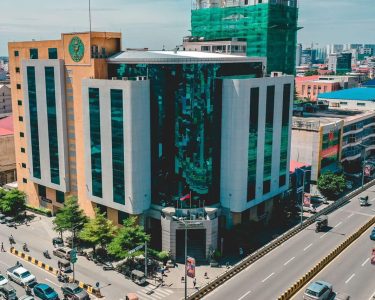By Kwang Hwee WEE-OON 光 辉 黄 温 CEO of SuperBankRatings
The sun rises over the Tonlé Sap, the great pulse of Cambodia, its waters swelling with the monsoon rains. This natural rhythm of ebb and flow has sustained the Kingdom for millennia, a predictable cycle around which life, trade, and commerce have organised themselves. For decades, however, Cambodia’s economic bloodstream, its financial system has lacked this same predictable rhythm. It has been a river with two strong currents: the US Dollar, the deep, dominant channel of formal business, and the Cambodian Riel, the shallow, vital stream of local, everyday life. This dollarisation provided stability after years of turmoil but created a fundamental weakness; a monetary policy executed by the Federal Reserve for the American economy, not for the needs of Phnom Penh, Siem Reap, or the rural villages.
But a new current is joining the flow, not to replace the existing waters, but to connect them in ways never before possible. This current is digital, and its most potent vessel is the stablecoin. And for the first time, the National Bank of Cambodia (NBC), once a wary observer of the crypto tide, is not building a dam but a navigation channel, a regulatory framework that could position Cambodia not as a follower, but as a leader in the next financial revolution.
The Economic Landscape: A Nation of Two Currencies
To understand the transformative potential of stablecoins, one must first walk the streets of Phnom Penh. A customer buys a smartphone from a glass-fronted store, pays in crisp US dollars, and receives change in a handful of crumpled Riel. A garment factory worker in a sprawling industrial zone sends a portion of their dollar-denominated salary back to their family in Prey Veng through a mobile payment app like Bakong, which likely converts it to Riel for their family to use at the local market. A small business owner takes out a loan in dollars but earns revenue in both currencies, constantly exposed to the tiny but perceptible fluctuations between them.
This is the daily reality of a highly dollarised economy. It creates a persistent friction:
The Monetary Policy Disconnect: The NBC’s ability to manage inflation, stimulate growth during downturns, or control interest rates is severely limited. It cannot print dollars. Its primary tool, the Riel, is not the primary medium of large-scale store of value.
Financial Exclusion: While mobile money has been a phenomenal success story with NBC’s Bakong system being a world-class example, it often serves as an on-ramp and off-ramp for existing bank accounts. For the truly unbanked, the barrier to entry, while lowered, still exists.
Inefficiency in Cross-Border Trade: Cambodia’s economy is deeply interlinked with its ASEAN neighbours, particularly Thailand and Vietnam. Settling payments for imports and exports is a slow, expensive process involving correspondent banks, foreign exchange fees, and days of delay.
The Digital Forerunner: NBC’s Bakong
The NBC is no digital novice. Its Bakong system, a blockchain-based retail payment platform, was a visionary leap. It achieved something remarkable: it created interoperability between all Cambodian financial institutions. For the first time, someone with an account at ACLEDA Bank could instantly send money to someone with a Wing mobile wallet. Bakong digitalised the Riel, supercharged its utility, and began to gently encourage its use.
But Bakong, for all its brilliance, operates within a domestic walled garden. It is a system for the Cambodian ecosystem, denominated primarily in Riel or dollar-backed digital tokens within its closed system. This is where the strategic opportunity for stablecoins emerges.
Stablecoins: The Strategic Bridge
A stablecoin is a digital asset pegged to a stable reserve asset, like the US dollar or gold. Think of it not as a volatile cryptocurrency like Bitcoin, but as a digital dollar programmable, instantly transferable, borderless, and operating on public, open-source blockchain networks.
Now, imagine the garment worker again. Instead of their salary being deposited into a traditional bank account and then sent via a closed system, their employer could send her (initially) in USDC (a popular dollar-backed stablecoin) directly to her digital wallet. This transaction would be near-instant and cost a fraction of a cent. She now holds her dollar-denominated salary not as physical cash or a bank balance, but as a digital asset she fully controls.
Here’s where the magic happens, the strategic synergy with NBC’s new regulatory posture:
1. The Export of Financial Services: They could use those stablecoins to pay for electricity, top up their phone, or buy groceries at any merchant that accepts them, all without converting to Riel. But more powerfully, they could send a portion to their family instantly. Their family in Prey Veng could hold those digital dollars as a hedge against Riel inflation or use them to pay for agricultural supplies imported from Thailand, all from a simple smartphone app. Cambodia could effectively “export” dollar liquidity and financial access to its most rural corners without building a single physical bank branch
2. Supercharged Regional Trade:A Cambodian rice exporter finalises a sale with a buyer in Singapore. Instead of invoicing in dollars and waiting days for a SWIFT transfer (that charges a % of transaction fee and/or fixed fee), they request payment in USDC. The payment settles on the blockchain in minutes, not days. The transaction is transparent, and the fees are negligible. The exporter’s costs drop, their competitiveness rises, and Cambodia’s position as a regional trade hub is strengthened. The NBC’s recent openness to licensing digital asset exchanges provides the crucial on-ramp and off-ramp for businesses to convert these stablecoins into traditional banking money seamlessly.
3. The Programmable Riel: The NBC’s ultimate masterstroke would be the issuance of a sovereign, Riel-denominated stablecoin. Imagine a “Digital Riel” issued and guaranteed by the NBC, operating on a secure, permissioned blockchain. This is not a replacement for physical Riel or Bakong, but its evolution. The government could disburse social welfare payments directly to citizens’ wallets with built-in rules (e.g., “can only be spent on food and fuel”). It could issue instant, targeted stimulus during economic shocks. Microloans could be disbursed and repaid with unprecedented efficiency, fostering small business growth. This programmable monetary policy would give the NBC tools of unparalleled precision to steer the economy.
The Regulatory Channel: NBC Building the Future
The NBC’s recent regulatory advancements are not an endorsement of wild speculation; they are the careful, deliberate construction of the plumbing for this new financial river. By moving to license and regulate digital asset businesses, the NBC is doing something critical: it is moving crypto activity from the shadows into the sunlight.
It is ensuring:
Consumer Protection: That companies holding citizens’ digital assets are solvent, secure, and accountable.
Anti-Money Laundering (AML): That the flow of digital funds is transparent and traceable, combating financial crime instead of enabling it.
Financial Stability: That this new system integrates safely with the traditional financial system, preventing systemic risk.
This regulatory framework is the invitation to global fintech talent and investment. It signals that Cambodia is open for business in the digital asset space. It encourages innovation within a safe sandbox, allowing Cambodian developers to build the applications that will power this new economy apps for farmers’ co-ops, for cross-border remittances, for micro-investing and much more.
The Confluence
The future of Cambodia’s economy lies at the confluence of its two monetary currents and this new digital stream. The US dollar’s stability and the Riel’s cultural significance are not under threat; they are being enhanced, connected, and supercharged by digital technology.
The National Bank of Cambodia, through its pioneering work with Bakong and its forward-thinking regulatory approach, has positioned the Kingdom not merely to adapt to the future of money, but to help define it. By embracing stablecoins both foreign-backed for global trade and a potential sovereign Digital Riel for domestic policy, Cambodia can overcome the legacy challenges of dollarisation, achieve unprecedented financial inclusion, and emerge as a agile, innovative, and resilient digital economy in the heart of Southeast Asia.
The river is rising. The new current is here. And with wisdom and foresight, Cambodia is building the vessel to harness its power.
For more information, please contact QnA@SuperBankRatings.com





